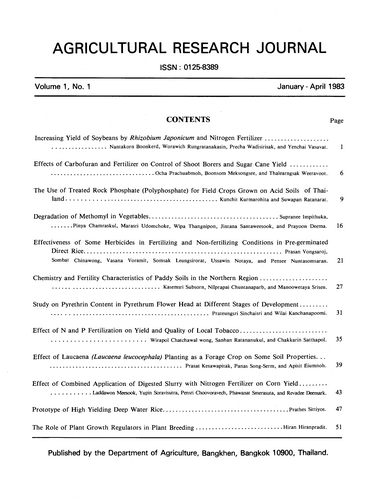Degradation of Methomyl in Vegetables
Abstract
Three different rates of methomyl (S-methy N-(methylcarbamoyl)oxy)thioacotimidate) were applied on various vegetables. The amount of 86.4 g/rai was applied to cabbage, Chinese cabbage, Chinese kale, and broccoli, The other two rates of 216 and 172.8 g/rai were applied on green onion and Chinese radish, repectively. In order to determine the residue and disappearance of methomyl. an experiment was conducted by varying the time of harvest between 0, 3, 5, and 7 days following methomyl application. After harvest, the vegetables were immediately extracted with acetonitrile by using a blender, and the methomyl residue was determined using the high pressure liquid chromatography (HPLC.)
Methomyl gradually disappeared. The residue was detected at the concentration of 0.08-1.40 ppm on day 7 following the application. the average half-life of methomyl was 5 days, and the recommendation for harvesting was 1, 4, 8, 3, 1, and 12 days following application for cabbage, Chinese cabbage, Chinese kale, green onion, broccoli an dchinese radish, respectively.
Downloads
Published
How to Cite
Issue
Section
License
Thai Agricultural Research Journal



